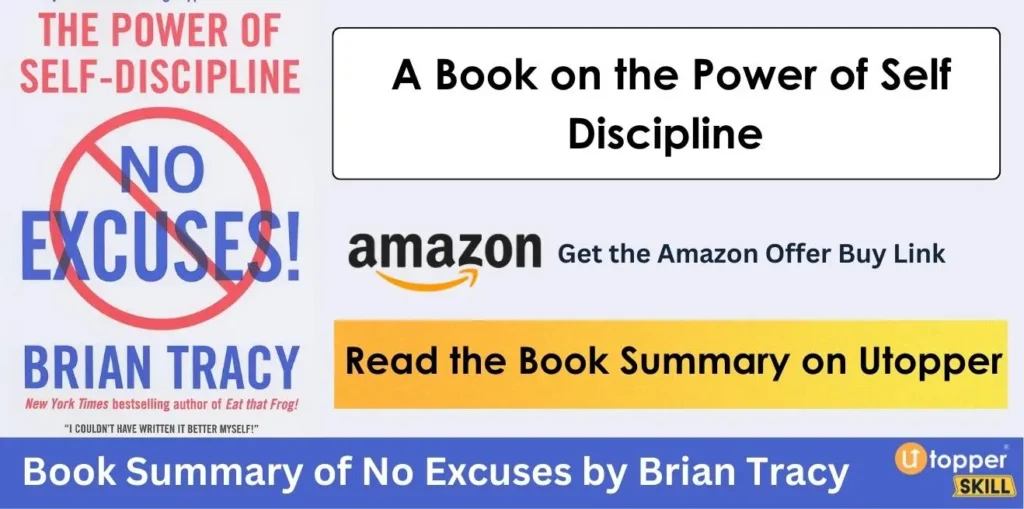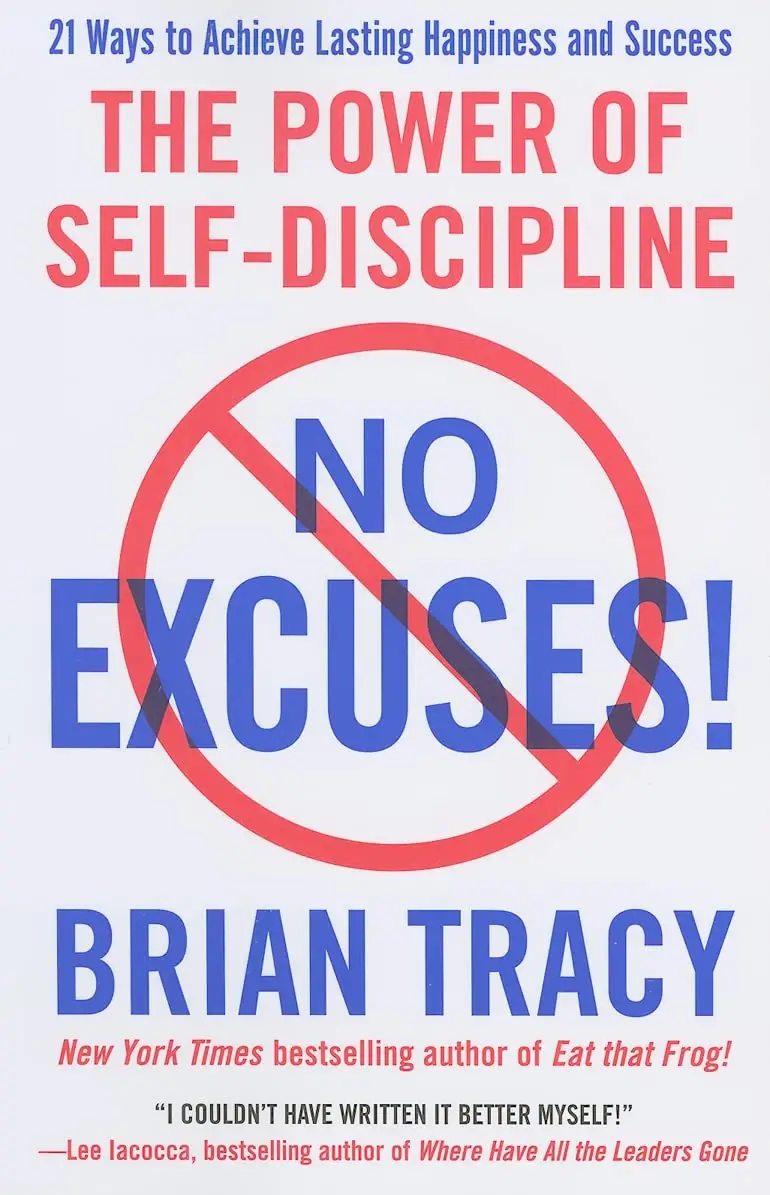No Excuses Book Summary

1 Line Summary of the Book
“No Excuses” by Brian Tracy is a self-help book that emphasizes taking personal responsibility for one’s life and achieving success through self-discipline, hard work, and goal-setting.
“No Excuses” by Brian Tracy is a self-help book that encourages readers to take personal responsibility for their lives and to overcome obstacles to achieve success. Tracy believes that success is not a matter of luck or circumstances, but rather a result of self-discipline, hard work, and goal-setting. In this article, we are Writing a Book summary of No Excuses, 1 Line summary of No Excuses, the Best quotes of No Excuses and the Best Lines of No Excuses.
In this book, he shares practical advice and strategies to help readers develop the mindset, habits, and skills necessary to succeed in any area of life, from business and finance to health and relationships. With its powerful message and actionable insights, “No Excuses” is a must-read for anyone who wants to take control of their life and achieve their full potential.
Introduction
Self-discipline is the key to success. This is the message that Brian Tracy’s book, “No Excuses!: The Power of Self-Discipline” conveys. It’s a comprehensive guide that teaches readers how to develop the discipline needed to achieve their goals and succeed in life. Tracy’s book is filled with actionable advice and practical tips that can help anyone become more self-disciplined. In this article, we will summarize the key points of the book and highlight the most important paragraphs.
Chapter 1:
Self-Discipline and Success The first chapter of the book highlights the relationship between self-discipline and success. Tracy states that self-discipline is the foundation of all success, and without it, one cannot achieve their goals. He goes on to explain that self-discipline is not something that some people are born with and others aren’t, but rather a skill that can be developed with practice. Tracy also stresses the importance of taking responsibility for one’s actions and avoiding excuses.
Chapter 2:
Self-Discipline and Personal Excellence In the second chapter, Tracy explains that self-discipline is the key to personal excellence. He defines personal excellence as “doing the very best that you can do in every area of your life.” Tracy argues that in order to achieve personal excellence, one must have the self-discipline to set goals, prioritize tasks, and focus on the most important things.
Chapter 3:
Self-Discipline and Goals The third chapter of the book focuses on the relationship between self-discipline and goals. Tracy explains that goals are essential for success and that self-discipline is necessary to achieve them. He emphasizes the importance of setting specific, measurable, achievable, relevant, and time-bound (SMART) goals and provides practical tips for achieving them.
Chapter 4:
Self-Discipline and Personal Development The fourth chapter of the book discusses the importance of personal development in achieving success. Tracy argues that self-discipline is necessary for personal development and that continuous learning and self-improvement are essential for success.
Chapter 5:
Self-Discipline and Character In the fifth chapter, Tracy emphasizes the importance of character in achieving success. He defines character as “the set of values, beliefs, and principles that you hold most dear.” Tracy argues that self-discipline is necessary to develop a strong character and that having a strong character is essential for success.
Chapter 6:
Self-Discipline and Responsibility The sixth chapter of the book focuses on the relationship between self-discipline and responsibility. Tracy explains that taking responsibility for one’s actions is essential for success and that self-discipline is necessary to do so. He also emphasizes the importance of avoiding excuses and taking action to achieve one’s goals.
Chapter 7:
Self-Discipline and Courage In the seventh chapter, Tracy highlights the importance of courage in achieving success. He argues that self-discipline is necessary to develop courage and that having courage is essential for success. Tracy provides practical tips for developing courage, such as facing fears and taking risks.
BUY “No Excuses”
“No Excuses” by Brian Tracy is a self-help book that emphasizes taking personal responsibility for one’s life and achieving success through self-discipline, hard work, and goal-setting.
Chapter 8:
Self-Discipline and Persistence The eighth chapter of the book discusses the importance of persistence in achieving success. Tracy emphasizes that self-discipline is necessary for persistence and that having persistence is essential for success. He provides practical tips for developing persistence, such as breaking tasks into smaller steps and focusing on one step at a time.
Chapter 9:
Self-Discipline and Action The ninth chapter focuses on the importance of taking action in achieving success. Tracy argues that self-discipline is necessary to take action and that taking action is essential for success. He emphasizes the importance of overcoming procrastination and taking action towards one’s goals.
Chapter 10:
Self-Discipline and Excellence The final chapter of the book brings together all the previous chapters and emphasizes the importance of self-discipline in achieving excellence. Tracy argues that self-discipline is the foundation of excellence and that excellence is essential for success in every area of life. He provides practical tips for developing self-discipline and achieving excellence.
Conclusion
“No Excuses!: The Power of Self-Discipline” is a powerful book that provides readers with practical advice and actionable tips for developing self-discipline and achieving success. Throughout the book, Brian Tracy emphasizes the importance of taking responsibility for one’s actions, setting goals, and avoiding excuses. He argues that self-discipline is the foundation of success and that it is a skill that can be developed with practice. By following the advice in this book, readers can develop the self-discipline needed to achieve their goals and succeed in every area of life.
The seven-step method is outlined in “No Excuses!: The Power of Self-Discipline” by Brian Tracy.
- Unlock Your Potential: The first step is to recognize that you have the potential to achieve anything you desire. By identifying your strengths and weaknesses, setting clear goals, and developing a plan of action, you can unlock your full potential and achieve success.
- Take Responsibility: The second step is to take complete responsibility for your life and your results. By accepting responsibility for your actions, decisions, and outcomes, you empower yourself to take control of your life and make positive changes.
- Set Clear Goals: The third step is to set clear, specific, and measurable goals for yourself. By defining what you want to achieve and creating a plan to get there, you can stay focused and motivated.
- Focus on Priorities: The fourth step is to prioritize your time and energy on the most important activities that will help you achieve your goals. By eliminating distractions and focusing on your top priorities, you can make progress towards your goals more quickly and efficiently.
- Develop Persistence: The fifth step is to develop persistence and perseverance. By persisting through challenges and setbacks, you can overcome obstacles and achieve your goals.
- Practice Continuous Learning: The sixth step is to commit to lifelong learning and personal development. By constantly seeking to improve your knowledge and skills, you can stay ahead of the curve and achieve greater success.
- Take Action: The final step is to take consistent, focused action towards your goals. By taking action every day and holding yourself accountable for your progress, you can achieve your goals and live a life of purpose and fulfilment.
Best Quotes of “No Excuses”
Here are some of the best quotes from “No Excuses” by Brian Tracy:
- “The greatest gift you can give yourself is the gift of self-education.”
- “The key to success is to focus our conscious mind on things we desire not things we fear.”
- “Your greatest asset is your earning ability. Your greatest resource is your time.”
- “The more credit you give away, the more will come back to you. The more you help others, the more they will want to help you.”
- “You have within you right now, everything you need to deal with whatever the world can throw at you.”
- “Success is not a destination, it’s a journey. The true essence of success is the willingness to persist through failures and to keep striving for excellence.”
- “The key to success is action, and the essential ingredient to action is perseverance.”
- “Your beliefs are the root of your behavior. Choose your beliefs wisely.”
- “You can’t change your destination overnight, but you can change your direction overnight.”
- “The more you discipline yourself to use your time well, the happier you will feel and the better will be the quality of your life in every area.”
“No Excuses” Book By Brian Tracy

Must Read Book for self-discipline, hard work, and goal-setting.
- “The greatest gift you can give yourself is the gift of self-education.”
- “The key to success is to focus our conscious mind on things we desire not things we fear.”
- “Your greatest asset is your earning ability. Your greatest resource is your time.”
- “The more credit you give away, the more will come back to you. The more you help others, the more they will want to help you.”
- “You have within you right now, everything you need to deal with whatever the world can throw at you.”
Lessons to Learn from “No Excuses”
Here are some of the best lines from “No Excuses” by Brian Tracy:
- “You are where you are and what you are because of yourself. Everything you are today, or ever will be in the future, is up to you.”
- “Successful people are simply those with successful habits.”
- “The only real limitation on your abilities is the level of your desires. If you want it badly enough, there are no limits on what you can achieve.”
- “The most valuable asset you have, in terms of achieving great success, is your ability to think.”
- “Every action you take is a vote for the type of person you wish to become.”
- “To be truly successful, you must take responsibility for yourself and for everything that happens to you.”
- “You cannot control everything that happens to you, but you can control your attitude toward what happens to you.”
- “The more you learn, the more you earn.”
- “Your success in life will be determined by the number of uncomfortable conversations you are willing to have.”
- “The key to success is to be willing to do the things that others are not willing to do.”
The Disaster Report in “No Excuses!: The Power of Self-Discipline” by Brian Tracy.
- Identify the Fear: First, identify the fear that is holding you back. Be specific about what you are afraid of and what is causing the fear.
- Worst-Case Scenario: Next, ask yourself, “What is the worst thing that could happen if this fear came true?” This will help you confront your fear and put it in perspective.
- Mitigation Strategies: Then, brainstorm strategies that could mitigate the worst-case scenario. Ask yourself, “What could I do to minimize the damage if the worst happened?”
- Best-Case Scenario: Finally, ask yourself, “What is the best thing that could happen if I overcame this fear?” This will help you focus on the positive outcomes and benefits of facing your fear.
Key takeaways from “No Excuses!“
- Self-discipline is the key to success in all areas of life.
- Self-discipline is a skill that can be learned and developed over time.
- Goal-setting is an important aspect of developing self-discipline.
- Prioritizing tasks and staying focused are essential for achieving goals.
- Responsibility and perseverance are important qualities for developing self-discipline.
- Building self-confidence and overcoming fear are essential for achieving success.
- Motivation is a key driver of self-discipline.
- The Disaster Report technique can be helpful for overcoming fear and developing self-discipline.
- Cultivating positive habits and routines is important for developing self-discipline.
- Practising self-discipline in one area of life can have a positive impact on other areas of life.
Key Points from “No Excuses!“
- Self-Discipline is the Foundation of Success – Tracy argues that self-discipline is the cornerstone of success, and it is the most critical factor that sets successful people apart from the rest. Without self-discipline, it is impossible to achieve any significant goals.
- Self-Discipline is a Habit – Tracy suggests that self-discipline is not an inborn trait, but rather a habit that can be developed over time. By taking small actions consistently, anyone can build self-discipline.
- Purpose and Clarity of Goals are Essential – To develop self-discipline, it is crucial to have clear and specific goals. Without a clear purpose, it is easy to get sidetracked and lose motivation.
- Take Action and Overcome Procrastination – Procrastination is the enemy of self-discipline, and it is essential to overcome it to achieve success. Tracy suggests taking immediate action and breaking down tasks into smaller, more manageable pieces.
- Focus on the Positive – Maintaining a positive mindset is critical to developing self-discipline. Rather than dwelling on failures or setbacks, focus on the progress made and celebrate small victories.
- Embrace Failure and Learn from Mistakes – Failure is inevitable in life, and it is essential to learn from mistakes and use them as stepping stones to success. Tracy emphasizes the importance of adopting a growth mindset and seeing failure as an opportunity to learn and improve.
- Continuous Improvement and Personal Development – Tracy emphasizes that self-discipline is not a one-time accomplishment but rather a lifelong pursuit. It is crucial to continually improve and develop oneself to maintain self-discipline and achieve success.
Frequently Asked Questions on “No Excuses”
Q.1 What is the main theme of this book?
The main theme of the book is the importance of self-discipline as a key to success in all areas of life.
Q.2 What are some of the topics covered in the book?
The book covers a wide range of topics related to self-discipline, including goal-setting, time management, procrastination, overcoming fear, building self-confidence, and staying motivated.
Q.3 Is this book suitable for people of all ages and backgrounds?
Yes, the book is designed to be accessible to people of all ages and backgrounds, regardless of their profession or personal goals.
Q.4 Does the author provide practical tips and strategies for developing self-discipline?
Yes, the author provides a range of practical tips and strategies for developing self-discipline, including goal-setting techniques, time management strategies, and ways to overcome procrastination and stay focused.
Q.5 Is the book based on scientific research?
While the book is not based on scientific research, it draws on the author’s many years of experience as a speaker, trainer, and author in the field of personal and professional development.
Q.6 What makes this book different from other self-help books?
The book stands out for its clear and actionable advice, as well as its focus on the importance of self-discipline as a fundamental aspect of personal and professional success.
Q.7 Can the strategies outlined in the book be applied to any area of life?
Yes, the strategies outlined in the book are designed to be applicable to a wide range of personal and professional goals, including career success, financial stability, and personal fulfilment.
Q.8 Is the book easy to read and understand?
Yes, the book is written in a clear and accessible style, with practical examples and exercises to help readers apply the concepts and strategies outlined in the book.
Q.9 Is the book recommended for people who are struggling with motivation and productivity?
Yes, the book is highly recommended for anyone who is struggling with motivation and productivity, and who wants to develop the self-discipline needed to achieve their goals.
